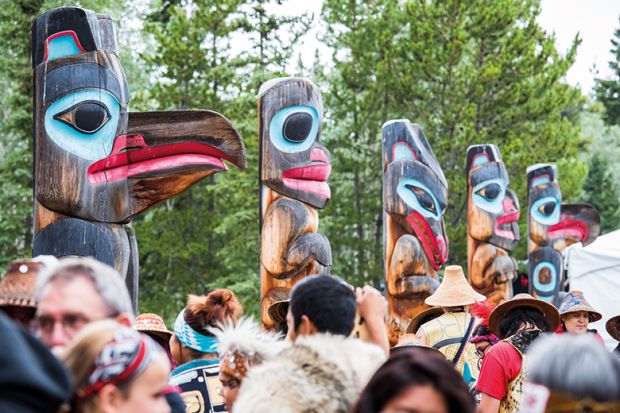An academic who has become the latest senior Indigenous staff member to resign from a Canadian university has told institutions to invest more resources in support for Aboriginal students as opposed to “tokenistic” senior positions.
Lynn Lavallée stood down from her role as vice-provost (Indigenous engagement) at the University of Manitoba earlier this month, claiming that her efforts to fight systemic racism were met with frequent resistance within the Winnipeg institution. She was the first person to fill the role after it was created last year.
The move is the latest in a string of resignations and dismissals of senior Indigenous staff at Canadian universities. Angelique EagleWoman, former law school dean at Lakehead University, left the Ontario institution in June and last month filed a lawsuit for constructive dismissal and racial discrimination.
Meanwhile, Sandra Muse Isaacs quit her job as Indigenous literature professor at Saint Mary’s University in Nova Scotia in June over the institution’s failure to “Indigenise the academy”, while Marilyn Buffalo, former senior adviser on Indigenous initiatives at the University of Alberta, was dismissed from the institution in February.
Dr Lavallée told Times Higher Education that she was optimistic when she started working at Manitoba because the institution’s strategic plan had “embedded throughout it [work on] Indigenous achievement”.
But she said that she had to constantly “provide a rationale for why an Indigenous programme might be important” and why it would not discriminate against other students on campus, particularly in departments that had a higher share of Indigenous students than the general student population.
“I’ve been doing this work a long time and I wanted to hit the road running. I don’t want to have to argue why we need it. I wanted to say how we’re going to do it,” she said.
Dr Lavallée added that she felt “embarrassed” that she could not set up a meeting between the university’s Indigenous Students’ Association and the president’s executive team. The meeting eventually took place following media reports, she said.
“That’s what I saw as my role as vice-provost of Indigenous engagement – recognising where Indigenous representation is not and trying to ensure that representation gets there,” she said.
“I started to feel ineffective. And if someone is in this role and they are feeling ineffective with respect to responding to community needs, not administration needs, then that can be a token position.”
Dr Lavallée said that the model of having “Indigenous people sit at the senior administrative table” would only work if they sat alongside “allies who are trying to advance the same sort of things”.
“If a situation arose and it became difficult or challenging for a particular unit at the institution, only when it became unmanageable was I invited to the table – almost to control the Indian population,” she said. “We cannot do that. That can’t be what these positions are…We can’t be coming in and trying to fix difficult situations for the institution.”
Dr Lavallée added that universities “need to put more resources not into senior-level positions that may have a certain optic nature but…into people who are working directly with Indigenous students”.
Next month, Dr Lavallée will start a new position as strategic lead for Indigenous resurgence in Ryerson University’s faculty of community services.
“I feel that I’ll be more effective in a faculty role, not a senior administrative role,” she said, adding that the term “resurgence” recognises that universities are colonial institutions and asks “how can we do better”.
Despite the challenges that remain, she said that she was “hopeful for the next generation” of Indigenous people.
“I’m optimistic in that I want my next generation to get a Western colonial degree…I want my niece to get her undergraduate degree,” she said.
“I see value in that for society. But I also want her to get her degree and not experience anti-Indigenous racism and not come out of the academy more harmed than when she came in.”
David Barnard, Manitoba’s president, said that the university has long been “engaged with teaching about Indigenous people” and that Indigenisation was an “area of great importance” for the institution.
He added that the university had established “a couple of different models” in recent years to ensure that there is Indigenous representation in the senior administration, and that Dr Lavallée “made significant contributions” while she was at the institution. Her departure provided an “unavoidable opportunity to think through” how a senior Indigenous role “should be configured”, he said.
POSTSCRIPT:
Print headline: ‘How can we do better?’
Register to continue
Why register?
- Registration is free and only takes a moment
- Once registered, you can read 3 articles a month
- Sign up for our newsletter
Subscribe
Or subscribe for unlimited access to:
- Unlimited access to news, views, insights & reviews
- Digital editions
- Digital access to THE’s university and college rankings analysis
Already registered or a current subscriber? Login








